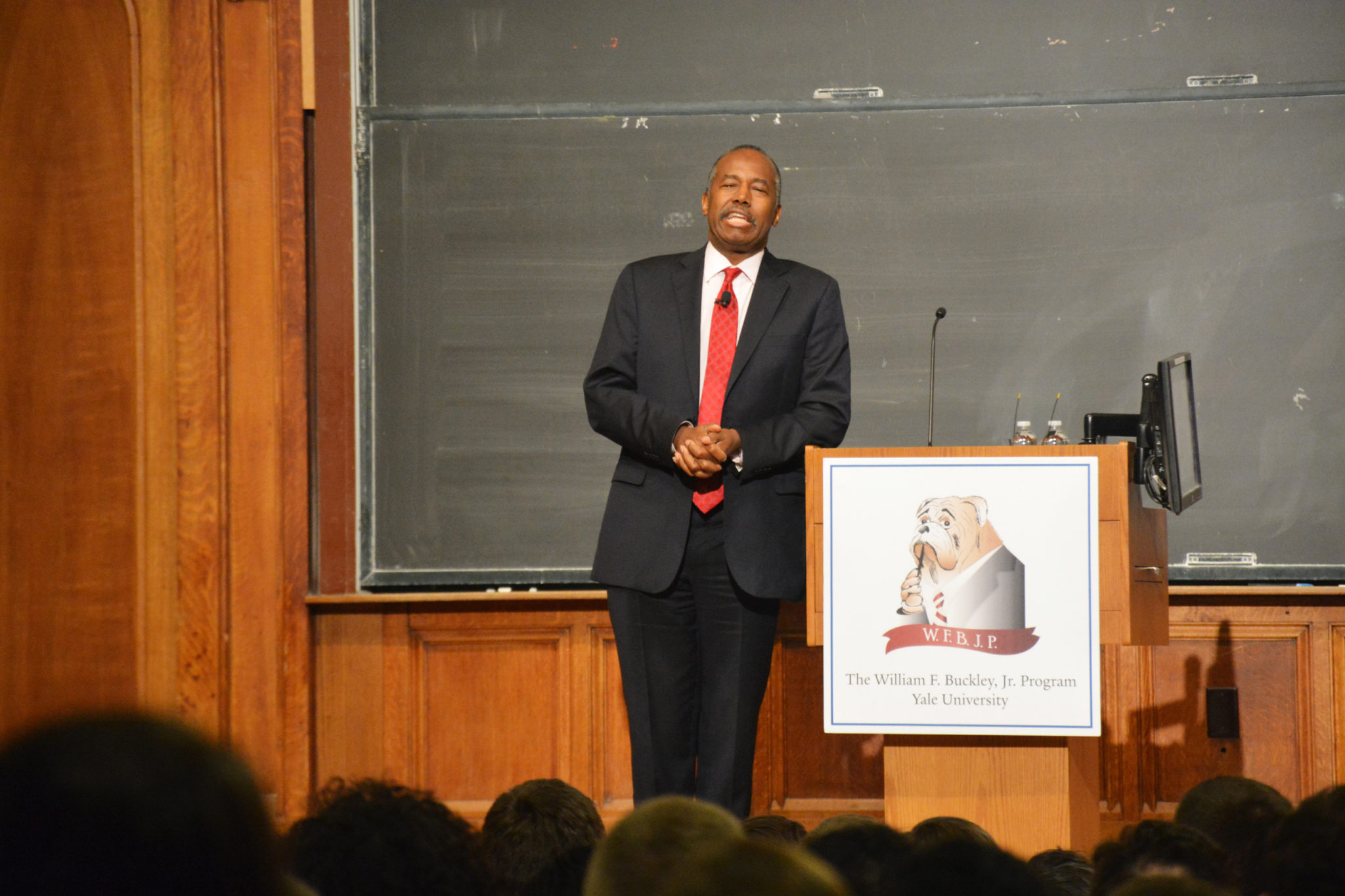
Security was tight and the line to enter the Sheffield-Sterling-Strathcona Hall stretched down the block and across Hillhouse Avenue Thursday night prior to Ben Carson’s ’73 address, sponsored by the William F. Buckley Program.
In his first public appearance since President-elect Donald Trump nominated him for secretary of housing and urban development, Carson received a standing ovation from the audience, following a broad-ranging discussion touching on his troubled childhood and success as a pediatric neurosurgeon. In the one-hour speech, Carson also voiced his views on the role of government in addressing the needs of America’s poor — particularly poor African-American — communities. Many hopeful attendees were turned away after students, faculty members, New Haven residents and journalists filled SSS 114, which can accommodate approximately 380 people.
“We need to think about why people are disadvantaged and what we can do to change that disadvantage,” Carson, who ran for president in the Republican primary, said. “It’s not just a matter of housing and security. Instead of just telling people you go to this place and we’ll pay for it, you give them some choice.”
Carson mentioned what he called “mechanisms of opportunity,” and suggested that the government should focus on providing education, particularly getting kids interested in reading, so as to allow the poor to “[climb] out of that state and become a part of the fabric and strength of this nation.”
Noting the plight of young African-American men — whom he noted some call “an endangered species” — he spoke about high incarceration and recidivism rates, and the lack of prominent black role models in science, business and American history. He suggested that more needed to be done to educate people in prison to provide them with a mechanism for obtaining a job.
Still, he highlighted significant but often-overlooked contributions by the African-American community, running down a long list of unheralded black inventors including Elijah McCoy, who held 57 U.S. patents, and Lewis Latimer, whom he described as Thomas Edison’s “right-hand man.”
The neurosurgeon-turned-politician interspersed his talk with a good deal of humor, cracking jokes about his disdain for prominent atheist Richard Dawkins and at one point engaging in a long, rapid-fire description of all the neural functions necessary for a person to raise their hand, in highlighting the amazing ability of the human brain.
“I found him very entertaining and an inspirational speaker,” said John Burger, the news editor at Aletiea.org. “I don’t know much about him so I can’t really make any judgements on things that he claims but it was good to hear different perspectives from one of the Trump nominees for cabinet.”
Answering questions from the audience about his outlook for the conservative party agenda, Carson took positions similar to those put forward by other future members of Trump’s Cabinet, such as advocating for school voucher programs and a six-month tax holiday to encourage the repatriation of cash held by U.S. firms in foreign countries.
When asked to state one piece of liberal ideology that he agrees with, Carson acknowledged that liberals see themselves as compassionate. But, he cautioned, they must dig deeper.
“Are the things your compassion is causing you to do actually helping or are they just making you feel good?” he asked.
Audience members interviewed expressed mixed opinions on the talk.
William Galligan ’20, a Buckley fellow, said he found the talk very anecdotal but nevertheless meaningful.
New Haven resident David Viscuso said that Carson came off as a “nice man” who made several good points about conservatism, but added that he disagreed with Carson’s argument that evolution and belief in God were incompatible.
Others were more critical.
“He sounded like a Democrat half the time,” said Paul Sebastian, who works at Yale, though he declined to say in what capacity. “He has no real understanding of the intricacies of public domestic policy, especially the intersection of housing policy and segregation in this country. The worst part of this for me was that the meaningful question to answer here is the actual plan to institute his desire to improve the plight of the poor in urban spaces. He could have given us an actual plan — he didn’t.”
Carson holds a bachelor’s degree in psychology from Yale.







